Mobile Menu

Lauryn Seering
FFRF insists on cancellation of Ark Encounter trip
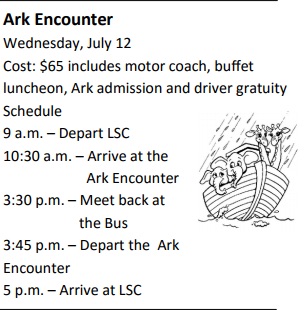 The Freedom From Religion Foundation is warning a government-funded Kentucky senior center against going ahead with an outing to an infamously unscientific Christian theme park.
The Freedom From Religion Foundation is warning a government-funded Kentucky senior center against going ahead with an outing to an infamously unscientific Christian theme park.
The Lexington Senior Center is advertising and promoting a day trip to the Ark Encounter on July 12. The Ark Encounter, recently constructed in Kentucky, is a Christian ministry run by the creationist Ken Ham, who also built the notorious Creation Museum. Ham has been clear about the proselytizing nature of this park from the beginning. In his June 27, 2016, letter entitled, "Our Real Motive for Building Ark Encounter," he lays out a clear, evangelistic goal:
We are eagerly approaching what I believe will be a historic moment in Christendom. It's the opening of one of the greatest Christian outreaches of our era: the life-size Noah's Ark in Northern Kentucky. . . . The [Creation] Museum and Ark direct people to the Word of God and the gospel of Jesus Christ.
Ham quotes bible verses to further illuminate his motive before finally stating it plainly: "Our motive is to do the King's business until He comes. And that means preaching the gospel and defending the faith, so that we can reach as many souls as we can . . . millions of souls will hear the most important message of all . . . a message of hope from the holy, righteous Judge who, despite our sin, wants us to spend eternity with Him!"
Ham's explicit declaration of his theme park's purpose makes it constitutionally impermissible for a government-funded institution to organize an excursion there.
"It is a fundamental principle of Establishment Clause jurisprudence that the government cannot in any way promote, advance, or otherwise endorse religion," FFRF's Patrick O'Reiley Legal Fellow Chris Line reminds Lexington Senior Center Program Manager Sean Wright. "Advertising and organizing such an event sends the message that residents are expected to support such religious events."
Such an endeavor also alienates those Lexington residents who are not Christian and who are nonreligious. Approximately one-fourth of the American population is nonreligious, and roughly 30 percent count themselves as non-Christian.
There are legal hindrances to such a trip, too. The Lexington Senior Center reportedly receives at least some of its budget from federal, state and county funds. Federal regulations prohibit senior centers receiving federal funding to engage in religious activities at government-sponsored functions. Additionally, the regulations clearly proscribe any discrimination on the basis of religious belief.
Visiting a religious ministry is an inherently religious activity. Therefore, advertising, promoting, endorsing or encouraging attendance for this kind of religious event places the agency in direct violation of the federal mandate.
"The brand of religious 'information' at the Ark Park is completely bogus and driven by missionary zeal," says FFRF Co-President Annie Laurie Gaylor. "A government-funded entity cannot be subsidizing and encouraging such absurdity."
FFRF is asking the Lexington Senior Center to cancel the July 12 trip and provide an assurance that it will no longer schedule, advertise or promote excursions to religious sites.
The Freedom From Religion Foundation is a national nonprofit organization with more than 29,000 members and chapters across the country, including members and a chapter in Kentucky. Its purpose is to protect the constitutional principle of separation between state and church, and to educate the public on matters relating to nontheism.
Indiana team’s trip a flagrant constitutional violation

The Freedom From Religion Foundation is warning an Indiana school district about allowing its high school soccer team to go on a Christian mission trip.
The NorthWood High School girl's soccer team, part of Wa-Nee Community Schools in Nappanee, took a mission trip to Panama last month. The excursion had been organized by the head coach through association with SCORE International, a short-term mission organization with an explicitly Christian agenda.
On its website, SCORE — which stands for "Sharing Christ Our Redeemer Enterprises" — lists its core values as including evangelizing the "lost" and expressing the Gospel. Its vision statement is: "To glorify God through missions in obedience to the Great Commission." (Matt. 28:19–20, 1 Peter 4:7–11.)
As an official representative of the public high school, Coach Phil Ummel inappropriately promoted the mission trip to a local news channel that was covering it. He also encouraged his athletes to go as a team. This would be the third such trip he has taken with his team, and Ummel stated that it is his goal to make it a tradition to attend the religious trip every three years. Some of the students who were interviewed in the televised news coverage mentioned that they were "looking forward to spreading the word of God" and becoming "closer to God" as part of the trip.
Public schools may not advance or promote religion. So, a public school coach bringing a team of student athletes on a mission trip through an organization with an evangelical purpose demonstrates a blatant promotion of Christianity over other religions, and of religion over nonreligion. In addition to simply being unconstitutional, this religious advancement excludes non-Christian and nonreligious students.
And the fact that participation in the mission trip was voluntary is irrelevant. Time and again, courts have rejected arguments that voluntariness excuses a constitutional violation. Similarly, the fact that SCORE is a private organization does not make the mission trip constitutional. Ummel's promotion of and participation in the mission trip while representing Wa-Nee Community Schools as a soccer coach are flagrant violations of the Establishment Clause.
"Public school officials in their professional capacities may not proselytize or encourage students to engage in religious activities, and must remain impartial in all matters regarding religion," writes FFRF Legal Fellow Ryan Jayne to Superintendent Joe Sabo. "Coach Ummel did not remain neutral here; he used his position as a district employee in order to promote his personal religion, and recruited his student athletes to help him."
FFRF is requesting that Ummel refrain from promoting or taking students on future mission trips.
"It is well outside the bounds of a public school employee to suggest what religious activities its students should participate or not participate in," says FFRF Co-President Annie Laurie Gaylor. "This is a shocking violation of the hallowed principle that state education and religion should be kept separate."
The Freedom From Religion Foundation is a national nonprofit organization with more than 29,000 members and chapters across the country, including over 400 in Indiana. FFRF's purpose is to protect the constitutional principle of separation between state and church, and to educate the public on matters relating to nontheism.
Photo via Shutterstock by Adam Tinney
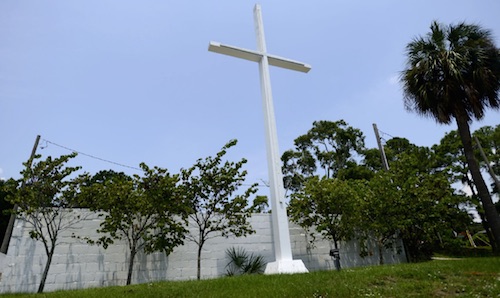
The Freedom From Religion Foundation is disappointed that the city of Pensacola is needlessly appealing a judicially ordered removal of a massive cross from a local park.
A few weeks ago, two of the country's leading secular organizations, FFRF and the American Humanist Association's Appignani Legal Center, achieved a major legal victory. On June 19, Senior U.S. District Judge Roger Vinson ruled that "the Bayview Cross can no longer stand as a permanent fixture on city-owned property." The 34-foot white Latin cross that the city of Pensacola owns, displays and funds dominates the Bayview Park. The cross is also the site of numerous Easter Sunrise services, frequently co-hosted by Christian churches.
Vinson ordered the cross removed within 30 days. The city had the option to appeal the case to the 11th U.S. Circuit Court of Appeals and has unfortunately opted to go that route.
The case was decided on clear, settled legal grounds. As Vinson pithily remarked, "The law is the law." Hence, it's a waste of both sides' time and money for Pensacola to appeal the constitutionally correct decision. The ruling by Vinson, a senior federal judge for the Northern District of Florida – Pensacola Division appointed by President Reagan, could best be characterized as begrudging. And yet he still comprehended the illegality of the Bayview Cross.
"This is not a 'borderline case,'" the judge stated. "The Bayview Cross clearly has a primarily — if not exclusively — religious purpose."
The city's decision to appeal seems to have been bolstered by the offer of the Becket Fund for Religious Liberty to represent it for free. Unfortunately, taxpayers are still on the hook for legal fees when FFRF and AHA win. The Becket Fund is a theocracy-rationalizing organization that FFRF has sparred with in the past and knows only too well. FFRF and the American Humanist Association are committed to seeing this case through to its rightful end.
"The city is at cross-purposes with the Constitution," says FFRF Co-President Annie Laurie Gaylor. "The Constitution demands that the Bayview Cross be removed."
The Freedom From Religion Foundation and the American Humanist Association's Appignani Legal Center filed the suit against the city on behalf of local plaintiffs who objected to the cross on public property. When the city refused to respond to warning letters and remove the cross from government property, the groups teamed up to take legal action in May 2016.
The plaintiffs in the case are Amanda Kondrat'yev; Andreiy Kondrat'yev; David Suhor and Andre Ryland. The case was brought by both FFRF and AHA, and handled by AHA's senior counsel Monica Miller and legal director David Niose, and FFRF staff attorneys Rebecca Markert and Madeline Ziegler. Case 3:16-cv-00195-RV-CJK
The Freedom From Religion Foundation, based in Madison, Wis., a 501(c)(3) nonprofit educational charity, is the nation's largest association of freethinkers (atheists, agnostics), and has been working since 1978 to keep religion and government separate. With more than 29,000 members and chapters all over the country, including almost 1,500 and a chapter in Florida, the organization also educates the public about nontheism.
FFRF wants cross removed from Georgia fire station

The Freedom From Religion Foundation is asking for an outsized cross to be taken down from a Georgia fire station.
A concerned local resident contacted FFRF to report that a large cross is on display at Catoosa County Fire Station 3 right off of U.S. Highway 41. The cross is clearly visible from the highway. Additionally, according to the complainant, the cross includes a Christian message about being saved.
"The religious significance of the Latin cross is unambiguous and indisputable," FFRF Managing Staff Attorney Rebecca Markert writes to Catoosa County Fire Chief Randy Camp. "An overwhelming majority of federal courts agree that the Latin cross universally represents the Christian religion, and only the Christian religion. And a majority of federal courts have held displays of Latin crosses on public property to be an unconstitutional endorsement of religion."
That's why it is blatantly unconstitutional for the Catoosa County Fire Department to display a patently religious symbol like a Christian cross or the proselytizing message shown with it on a public roadside, FFRF emphasizes to Camp. The cross displayed at Fire Station 3 unabashedly creates the perception of government endorsement of Christianity. It also conveys the message to the 30 percent of Americans who are not Christian, including the 23 percent who are not religious, that they aren't "favored members of the political community," to quote the U.S. Supreme Court. The cross has an exclusionary effect, making non-Christian and nonbelieving residents of Georgia into political outsiders.
"An essential service such as the fire department should not be seen as playing religious favorites," says FFRF Co-President Annie Laurie Gaylor. "Such a display of bias fuels public alienation from our government."
FFRF is asking the Catoosa County Fire Department to remove the cross from Fire Station 3 immediately and ensure no religious iconography or messages are displayed on public property in the future.
The Freedom From Religion Foundation is a national nonprofit organization with 29,000 members and chapters across the country, including nearly 500 members and a chapter in Georgia. FFRF's purpose is to protect the constitutional principle of separation between state and church and to educate the public on matters relating to nontheism.
FFRF demands that N.H. state agency stop proselytization
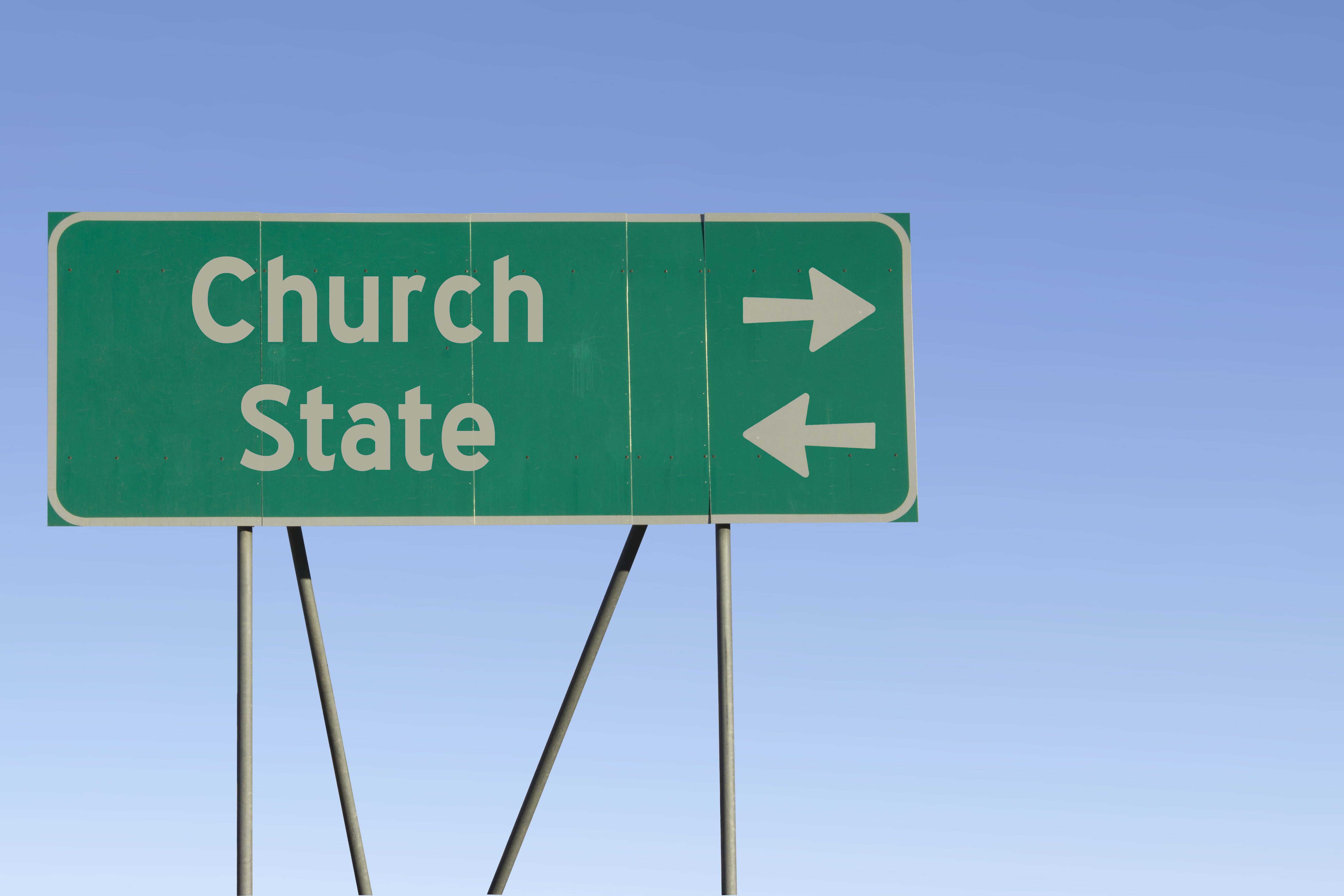
The Freedom From Religion Foundation is insisting that a New Hampshire state agency put a halt to the blatant propagation of Christianity during official safety lessons.
The New Hampshire Fish and Game Department facilitates hunter safety classes throughout New Hampshire. A person who contacted FFRF attended a class on April 6-8 hosted by the Heritage Free Will Baptist Church in Laconia, N.H. The complainant reported that everyone who attended the class received religious flyers with prayers and information about church services. A pastor taught this class. The religious materials were enclosed with all of the official hunter's safety documents and study packets.
These proselytizing handouts are demeaning to non-Christians and nonbelievers, FFRF points out. Such a misuse of a state function for sectarian purposes is unconscionable.
"It is a fundamental principle of Establishment Clause jurisprudence that a government entity cannot in any way endorse religion," FFRF Co-Presidents Dan Barker and Annie Laurie Gaylor write to Glenn Normandeau, executive director of the New Hampshire Fish and Game Department. "Allowing churches to distribute their religious literature through a class co-sponsored by New Hampshire Fish and Game constitutes government endorsement and advancement of religion."
Moreover, when it permits Christian proselytizing during official events, the state of New Hampshire ignores the diversity of religious beliefs among its citizens. It also sends the message to members of the audience who are nonadherents "that they are outsiders, not full members of the political community and an accompanying message to adherents that they are insiders, favored members of the political community," to quote the U.S. Supreme Court. Such practices alienate non-Christian members of the public, including the 23 percent of the U.S. population that is nonreligious.
"New Hampshire owes its substantial portion of non-Christians and nonbelievers not to allow the blatant imposition of religiosity during a state-organized training course," says Gaylor. "Churches cannot be permitted to take advantage of a captive audience in this manner."
FFRF urges the New Hampshire Fish and Game Department to investigate this matter and ensure that future classes co-sponsored by the department not involve the distribution of religious materials. It also asks that the department refrain from conducting any future workshops in churches.
The Freedom From Religion Foundation is a national nonprofit organization with more than 29,000 members across the country, including in New Hampshire. Its purpose is to protect the constitutional principle of separation between state and church and to educate the public on matters relating to nontheism.
Congress stealthily permitting church electioneering
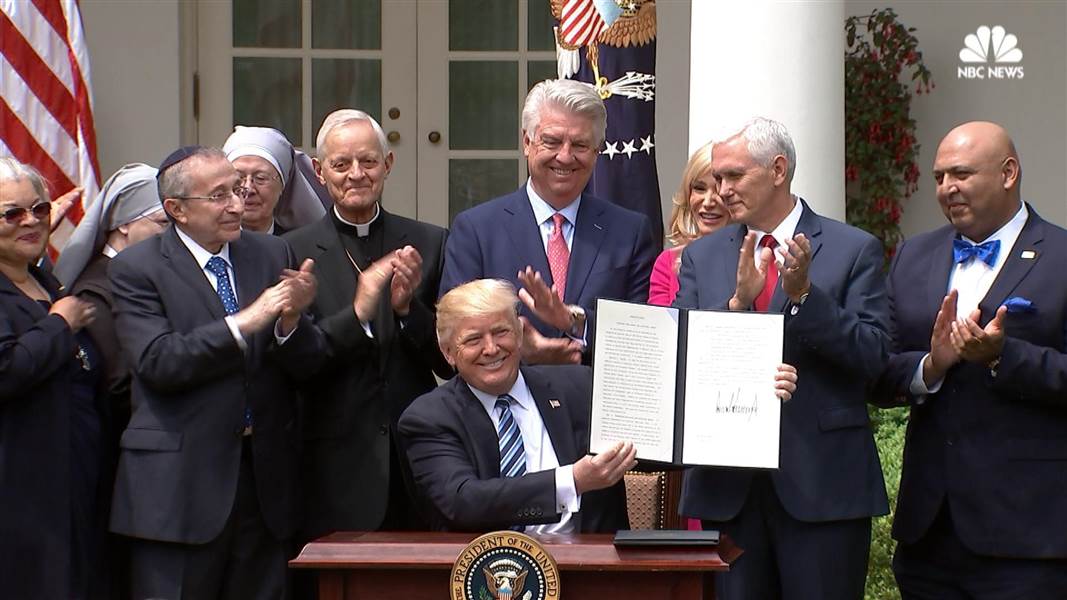
Congress is engaging in cloak-and-dagger tactics to thwart public opinion with a sneaky attempt to undermine a more than 60-year-old prohibition on church electioneering.
But rather than go along with the public consensus, House Republicans have now tried to hamstring the Johnson Amendment through a provision buried 116 sections deep in the House Financial Services appropriations bill . The provision reads: "None of the funds made available by this Act may be used by the Internal Revenue Service to make a determination that a church, an integrated auxiliary of a church, or a convention or association of churches is not exempt from taxation for participating in, or intervening in, any political campaign on behalf of (or in opposition to) any candidate for public office unless" and is followed by a series of restrictions meant to ensure that no church is ever penalized for violating the law. Specifically, the Commissioner of Internal Revenue must personally consent to enforcement, must notify Congress of the IRS' intent to enforce the law, and must then wait 90 days before making a determination against the church.
Note that these additional protections against enforcement are only contemplated for churches and associations of churches, but not for other nonprofits, who are equally bound by the Johnson Amendment. The result is unequal treatment under the law — a preferential boon to churches in violation of the Constitution's separation between religion and government.
In May, FFRF testified before Congress on the dire implications of scuttling the Johnson Amendment.
"In short, overturning the Johnson Amendment would make the Citizens United decision look trivial and nominal," it said. "If the Johnson Amendment is repealed, millions, possibly billions, will inevitably flow into and out of churches for political purposes."
The Freedom From Religion Foundation filed a legal challenge in May against President Trump's "religious liberty" executive order. The order and Trump's repeated statements clearly communicated to churches that they can now endorse political candidates from the pulpit, hence undercutting the Johnson Amendment via the executive branch. Congress is now intent on the same result legislatively.
Defunding enforcement is no different than overturning it, and FFRF condemns any attempt to give churches special treatment.
"Theocrat-loving members of Congress are surreptitiously trying to chip away at the wall of separation," says FFRF Co-President Annie Laurie Gaylor. "But we will not allow them to get away with this."
The Freedom From Religion Foundation is a nonprofit membership organization that advocates for the separation of church and state and educates on matters relating to nontheism. It has more than 29,000 members residing in every state of the United States, including 1,200-plus in Wisconsin, as well as members in the District of Columbia.
FFRF, ACLU file appeals brief in Indiana nativity case
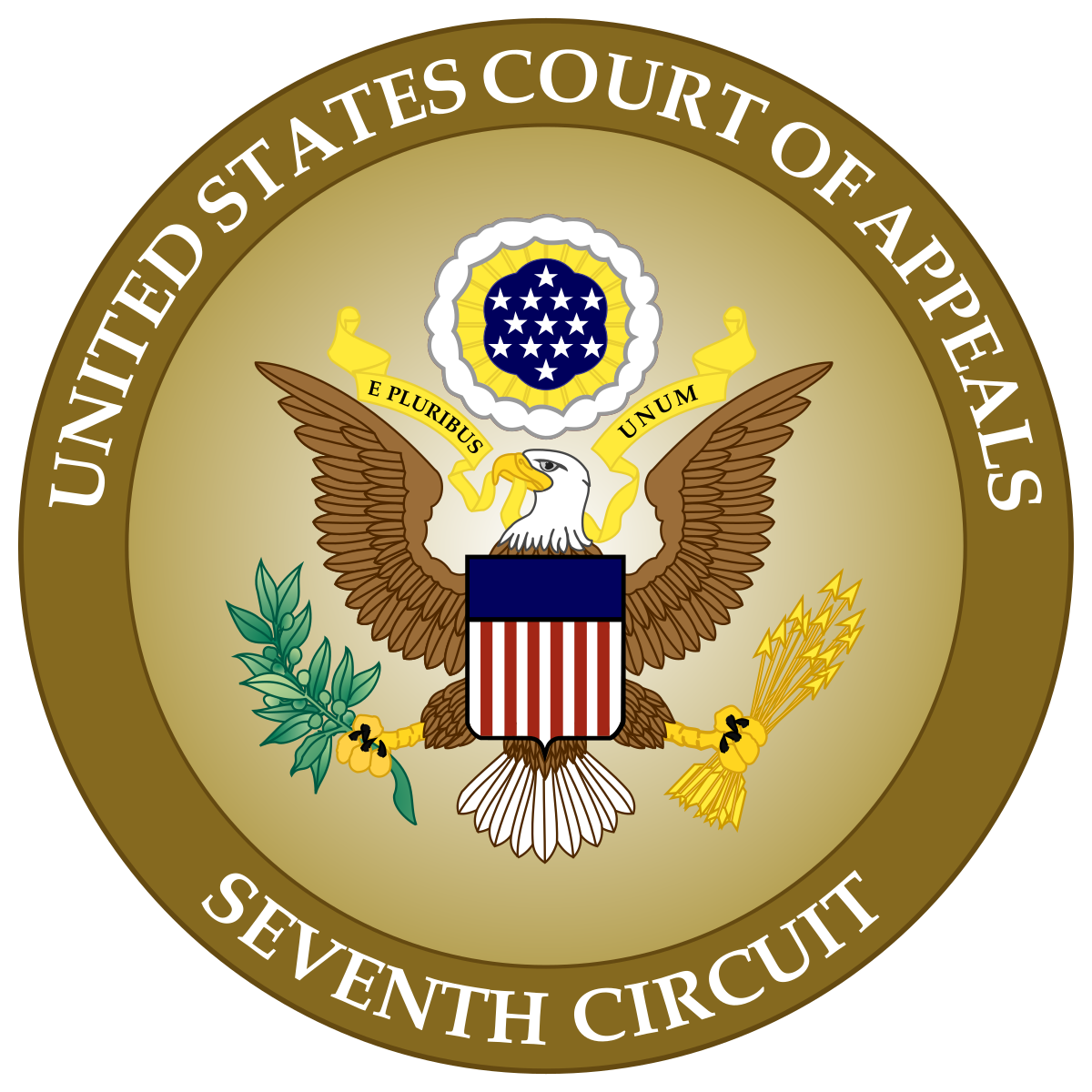 Two prominent watchdog organizations have taken the next step in an intense Indiana state/church legal battle.
Two prominent watchdog organizations have taken the next step in an intense Indiana state/church legal battle.
Each December for nearly half a century, the Performing Arts Department of Concord High School in Elkhart, Ind., staged several performances of its "Christmas Spectacular." Each performance culminated in an enactment of the biblical story of the birth of Jesus, with live student actors and scriptural recitations from a school employee, all set to music performed by the school's various musical groups. When U.S. District Judge Jon DeGuilio issued a preliminary injunction in late 2015 against the live nativity, the school responded by using mannequins to stage a static nativity scene while students performed the same Christmas devotionals. While DeGuilio ruled on March 6 of this year that the live nativity was "an impermissible message of endorsement," he also ruled that the school could continue displaying its static nativity scene.
On June 29, the Freedom From Religion Foundation, the ACLU, and the ACLU of Indiana filed their brief to the 7th U.S. Circuit Court of Appeals revealing exactly why the version of the nativity scene Concord Community Schools has used the past two Decembers is illegal. None of the changes the school district made alter the inherently religious nature of the 24-minute musical celebration of the story of Jesus' birth that constitutes the grand finale of each year's concert.
"For 24 minutes, the school employs high school students to stage a musical telling of the story of the birth of Jesus in front of a captive audience of their friends, their family, members of the community, and, once a year, elementary school students from within the district," the brief states. "This grand finale of the Christmas Spectacular stands head and shoulders above any other routine, and neither the enormity nor the religiosity of the performance can be denied."
The brief argues that the current version of the nativity performance "violates three independent tests under the Establishment Clause of the First Amendment: the coercion test, the endorsement test, and the purpose test." The "purpose" test refers to the first prong of the traditional "Lemon test" used to evaluate Establishment Clause cases. The brief highlights how plaintiff Jack Doe was quite literally coerced into performing during the nativity portion of the Christmas Spectacular as "a required part of [his] educational experience." It goes on to note that Concord Community Schools endorses a pervasively Christian message by directing its students "to engage with the religious message of the nativity performance and intends the performance — and the religious significance of the nativity — to captivate."
Currently the final briefs on appeal are due to be filed by mid-August. Appellees hope for a decision from the 7th Circuit well before preparations begin for the 2017 winter concert.
"There is no legal precedent that would countenance a public school displaying Christian nativity scenes, particularly on stage while students sing Christmas carols," FFRF Co-President Annie Laurie Gaylor has said. "We're pleased to have stopped the egregious violation of a live nativity pageant. But FFRF, our plaintiffs and the ACLU all consider it unacceptable to allow this school district, with its long history of promoting Christianity, to continue to display a nativity scene at a school event."
The appellees, who are Concord Community Schools families with students in the Performing Arts Department, are being represented by the Freedom From Religion Foundation, the ACLU of Indiana and the national ACLU.
FFRF thanks the families in the Concord Community Schools (who are suing pseudonymously for their protection), for making possible the continuing litigation to correct this major First Amendment violation.
The Freedom From Religion Foundation is dedicated to the separation of state and church, with 29,000 nonreligious members nationwide, including more than 400 in Indiana.
Attorneys on the case include Gavin Rose of the ACLU of Indiana, Sam Grover and Ryan Jayne of FFRF, and Daniel Mach and Heather L. Weaver of the ACLU. FFRF v. Concord Community Schools, Case No. 3:15-cv-00463, was in the U.S. District Court for the Northern District of Indiana, South Bend Division, and is now before the 7th Circuit Court of Appeals.
Indiana school board ceases prayers

After receiving a warning from the Freedom From Religion Foundation, an Indiana school board has ended its dubious practice of opening meetings with prayer.
At three board meetings this year, the Southern Wells Community School Board in Wells, Ind., held opening prayers with one led by the board's vice president. FFRF wrote to remind the board that public school boards should not include, schedule or conduct prayer as part of their meetings, just as public schools may not impose prayer at other school events. They also are not to engage in school-official-led prayer. In a letter to the school board president, Kevin Scott, FFRF asked that the board end the religious practice immediately.
School board prayer has time and again been struck down by federal courts as a violation of the Establishment Clause. In the federal court case Indian River School District the court emphasized that school board prayer is parallel to other school prayer cases when it comes to protecting children from the coercion of school-sponsored prayer. The court concluded that the school board's prayer was beyond the level of church and state interaction permitted by the Establishment Clause.
FFRF Legal Fellow Ryan Jayne informed Scott that prayer during Southern Wells Community School Board meetings breaches this court ruling and, therefore, is a violation of the First Amendment.
"The issues discussed and decisions made at board meetings are wholly school-related, affecting the daily lives of district students and parents," wrote Jayne. "Prayer at public school board meetings is no different than a prayer given at other school district events and is unconstitutional."
Scott replied in a letter that the school board would comply with FFRF's legal advice.
"Upon advice of our school counsel, the school board's practice of including prayer as a part of board meetings will be discontinued until the United States resolves the split between the Circuits on this issue sometime in the future," wrote Scott.
FFRF warmly commends the school board's choice to disentangle religion from public education.
"The school board did the right thing by choosing to comply with federal courts and the First Amendment," says FFRF Co-President Annie Laurie Gaylor. "The public school board should focus on its secular duties to serve all of its students, including the many Millennials today who are nonreligious."
The Freedom From Religion Foundation is a national nonprofit organization with more than 29,000 members and chapters across the country, including over 400 in Indiana. FFRF's purpose is to protect the constitutional principle of separation between state and church.
Photo by Syda Productions via Shutterstock.
FFRF appalled at new Kentucky bible law

The Freedom From Religion Foundation is appalled at a new law in Kentucky that promotes the bible in the public school system.
"A new Kentucky law going into effect Thursday will allow bible courses to be taught in public schools," states an article in The Hill. "Gov. Matt Bevin (R) signed the bill Tuesday, NBC News reported, but watchdog groups concerned about church and state separation fear the classes may cross the constitutional line and go from teaching to preaching."
You can bet that FFRF is concerned. For months, it had been watching the bill, which permitted local school boards to develop an elective bible literacy class as part of social studies curriculum. The state/church watchdog is dismayed that Bevin would sign such a transparent attempt to impose religion on other people's children, but not surprised given that he thinks prayer can cure crime.
As FFRF members said when they contacted their legislators several times during the process to explain the problems with the bill, the law is ripe for abuse. And it likely will lead to a losing lawsuit, which could cost schools hundreds of thousands of dollars.
"How will the Kentucky Board of Education ensure the course does not become devotional?" FFRF Co-President Annie Laurie Gaylor has said. "The bill already shows bias by singling out only one so-called 'holy book' for study."
FFRF attorneys and members will be closely observing the implementation of the bill. Any school districts that overstep the bounds will end up like Mercer County Schools in West Virginia, facing FFRF in a losing court case. FFRF has a high-profile legal challenge in federal court over weekly fundamentalist bible classes in elementary and middle schools there. The courses have been suspended as the lawsuit proceeds.
Kentucky parents who are concerned about a bible class in their schools are urged to monitor or get involved at their local school board meetings and to contact FFRF early in the process if a bible course is implemented at their child's school.
FFRF has successfully stopped other illegal bible classes, most notably a class in Mustang, Okla., promoted by the Green family, which owns the Hobby Lobby chain.
If the Kentucky law results in the imposition of religion onto the state's public schools, FFRF will not hesitate to push back.
The Freedom From Religion Foundation is the largest freethought association in North America, with more than 29,000 members and chapters all over the United States, including membership and a state chapter in Kentucky.
FFRF censures Missouri anti-women legislation

The Freedom From Religion Foundation strongly denounces a piece of pending anti-choice legislation that would endanger the well-being of women across Missouri.
Senate Bill 5, introduced in the Missouri Senate on June 12, it bolted through the two legislative chambers over the past couple of weeks. The state House exacerbated the original bill, adding even harsher language, before passing it. It is now back in the Senate chamber for a final floor vote. If it passes, it will land on the governor's desk and almost certainly become law.
SB 5 imposes several ridiculous, medically unnecessary restrictions on abortion providers under the false pretext of support for women's health. The bill would impose financial burdens on clinics that provide abortions, with the aim of forcing them to shut down and ultimately making it more difficult for women to safely terminate an unwanted pregnancy.
The bill brazenly restricts health clinics from providing necessary medical intervention and adds penalties to existing regulations that include unscheduled inspections of women's health clinics. SB 5 sets up targeted restrictions of abortion providers (TRAP laws) that do not support women's health, as lawmakers deceitfully claim. Additionally, the bill limits regulations of "Crisis Pregnancy Centers," which are misleading anti-choice clinics that distribute fallacious information to women seeking pregnancy tests and information on abortion options. Moreover, the bill grants the attorney general's office the power to prosecute abortion providers.
As if restricting women's access to healthcare and reproductive rights weren't enough, SB 5 also puts Missouri women at risk of losing their jobs and homes. Arguably, the most nefarious part of the bill overturns a St. Louis ordinance passed in the spring in that bans employers and landlords from discriminating against people on the basis of their reproductive health decisions. In other words, SB 5 would allow a women to be evicted and / or fired for using birth control, becoming pregnant while unmarried or aborting a pregnancy. This sensible city ordinance was derided by Missouri Gov. Eric Greitens for its radical implication: that women should be permitted sexual and reproductive independence and privacy without risking financial security. Essentially all women who are sexually active and of a reproductive age have used some form of contraception.
All in all, SB 5 clearly seeks to govern the sexuality of women in the state by theology-based legislation that willfully ignores medical research.
"This unacceptable bill would empower Missouri employers and landlords to govern the intimate choices women make about their bodies and lives," says FFRF Co-President Annie Laurie Gaylor. "It is obvious that in eyes of many in the state government, anti-scientific religious dogma comes before, and may soon hold power over, women's rights and autonomy."
The Freedom From Religion Foundation is a national nonprofit organization with more than 29,000 members and chapters across the country, including over 360 in Missouri. Its purpose is to protect the constitutional principle of separation between state and church.
Plaintiffs Michael Anderson, Larry Madonado and attorney David J.P. Kaloyanides, along with FFRF and 20 other plaintiffs, won a lawsuit against the Chino Valley School District in February 2016, stopping prayers during board meetings.
The Freedom From Religion Foundation is asking the 9th U.S. Circuit Court of Appeals to uphold a lower court ruling against prayer at meetings of a California school board.
A district court in February 2016 granted summary judgment in favor of FFRF and its 22 plaintiffs, declaring school board prayer in Chino Valley District, Calif., an unconstitutional government endorsement of religion. The decision by U.S. District Judge Jesus G. Bernal, Central District of California, also ruled the school board policy and custom of reciting prayers, bible readings and proselytizing violated the Establishment Clause of the First Amendment.
FFRF filed its lawsuit in November 2014. After FFRF won at the district court level, the school board voted to appeal the decision in a controversial 3-2 vote at a contentious meeting. On March 31, 2016, the court ordered the district to pay more than $200,000 in attorney's fees and costs.
The board did not contest the other religious conduct in which the school board members engaged, including bible recitation and readings, religious commentary on social and political matters, and proselytizing at the school board meetings. For example, board member James Na told the audience at one meeting that "God appointed us to be here." He also told an audience:
Man, as we were born is flawed. We're not complete. We're not God. . . Pastor Frank Gonzalez was right in his prayers, that I need [to] first look up to Jesus Christ for serving our students...because without that, we'll be flawed just like those judges in superior court or on the local bench.
The purpose behind hosting prayers, reading from the bible, and proselytizing is apparently, as Na stated at one meeting, to "urge[] everyone who does not know Jesus Christ to go and find Him."
Another board member, Andrew Cruz, told the audience at a meeting that the board had a goal: "And that one goal is under God, Jesus Christ." Cruz then read from the bible, Psalm 143:8.
Chino Valley Board meetings feature adults — board members, staff, or clergy — nearly always Christian, delivering a prayer. And those prayers are imposed on students. The board includes a student representative. Students are invited to lead the Pledge of Allegiance, and they and their parents often have cause to attend board meetings.
The school board argues that it is similar to a legislative board, thereby invoking two decisions by the U.S. Supreme Court that permit, under narrow circumstances, governmental prayer.
"By attempting to reframe the nature, purpose, and function of a public school board, the school board members in this appeal try to squeeze themselves into the narrow exception of legislative prayer," writes FFRF.
"The meetings of the school board can only be seen as school functions. Appellant school board members here are not a legislative body but rather a specific type of governing body tasked with one and only one duty: to govern all aspects of the public schools for the benefit and well-being of the children who are students within their district," FFRF's brief states. Both the 3rd and 6th Circuit Courts of Appeal have prohibited prayer at school board meetings. Only the 5th Circuit, in the recent McCarty decision, a challenge brought by the American Humanist Association, has ruled otherwise. In that narrow case, the school board in Birdville, Texas, actually dropped prayers in favor of an unregulated student statement following a challenge.
FFRF notes the board's policies and practices have no secular purpose and act to unconstitutionally endorse religion.
"We're confident that the 9th Circuit will firmly agree with us," says FFRF Co-President Dan Barker. "Public school boards exist to oversee secular education, and must protect rights of students and their parents by keeping religious devotions and divisiveness out of official school board functions."
Barker observes that FFRF, a state/church watchdog with more than 29,000 nonreligious members, including over 3,500 in California, had the unprecedented experience of having to turn away plaintiffs. "Many parents, students and community members came to us seeking help to curb the religious acrimony created by school board members who are misusing their civil authority to promote their personal religious views," he says.
Public opinion and the law are both with the Freedom From Religion Foundation in Chino Valley.
FFRF v. Chino Valley Unified School District has Case No.: EDCV 14-2336-JGB (DTBx). The brief on behalf of FFRF and its plaintiffs was written by litigation attorney David J.P. Kaloyanides, and FFRF Staff Attorneys Andrew L. Seidel and Rebecca Markert, serving as co-counsel.




